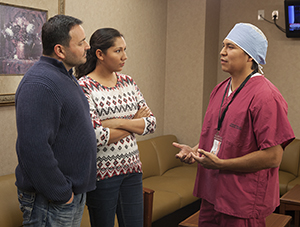When Your Child Needs Emergency Surgery
Your child is having emergency surgery. This means you might not have time to learn about your child’s surgery or to prepare your child. It can be a scary time. Hospital staff can help answer your questions. Read this sheet to know what to expect.
What to expect before emergency surgery

Before your child’s surgery, the following may occur:
-
You’ll meet with the surgeon. They will explain why your child needs surgery. The surgeon will talk with you about risks and possible complications. You’ll need to sign a consent form. This is to give permission for your child to have surgery.
-
You’ll meet with the anesthesiologist. This is a healthcare provider trained to give anesthesia. There are different types of anesthesia. Your child will likely have general anesthesia. This medicine causes your child to fall asleep and not feel pain during surgery. You may need to sign a separate consent form for your child to have anesthesia.
What you may be asked for at the hospital
You may be asked to give this information:
-
Identification (ID) for you and your child, such as a driver’s license or Social Security card
-
Health insurance cards
-
Proof of guardianship, if you are not the child’s natural parent
-
Medical records for your child such as vaccine records, lab test results, or X-rays
-
List of medicines your child is taking
-
List of allergies your child has to medicines, food, or latex
-
Allergic reactions your child had in the past to any sedatives or anesthesia
-
Illnesses or surgery that your child has had
During emergency surgery
-
The surgeon will perform the surgery.
-
The anesthesiologist will control the amount of anesthesia your child receives. A nurse anesthetist may assist them. This person is also trained to give anesthesia. Devices are used to watch your child’s heart rate, blood pressure, and blood oxygen levels. The anesthesia will be stopped once surgery is done.
After emergency surgery
-
Your child is taken to a postanesthesia care unit (PACU) or a recovery room.
-
Your child may have catheters or tubes put in place during surgery. These may be in their nose, mouth, bladder or coming from a wound. These tubes are to help your child's recovery. The surgeon or nurse will tell you how long they need to stay in.
-
You may be allowed to stay in the PACU or recovery room with your child. Every child reacts differently to anesthesia. Your child may wake up confused, upset, or crying. These reactions are normal. They usually pass quickly.
-
Incisions may be covered with a bandage or dressing.
-
Your child will be given pain medicine to stay comfortable. These may be sent through an IV (intravenous) line.
-
Monitors will be attached to your child. These check your child’s vital signs.
-
When ready, your child will be given clear liquids after surgery. They will slowly be given solid foods and then return to a normal diet.
-
The surgeon will tell you how long your child will need to stay in the hospital.
-
Follow all discharge and home care instructions when your child leaves the hospital.
Online Medical Reviewer:
Chelsey Schilling BSN RN
Online Medical Reviewer:
Raymond Turley Jr PA-C
Date Last Reviewed:
9/1/2025
© 2000-2025 The StayWell Company, LLC. All rights reserved. This information is not intended as a substitute for professional medical care. Always follow your healthcare professional's instructions.